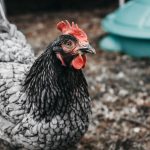The egg-laying process in chickens is a complex and fascinating biological phenomenon. It begins with the development of the ovum, or egg cell, in the hen’s ovary. Once the ovum is mature, it is released into the oviduct, where it begins its journey towards becoming a fully formed egg.
As the ovum travels through the oviduct, it is fertilized by sperm if a rooster is present, and then it is surrounded by layers of albumen (egg white), membranes, and finally the shell. This entire process takes approximately 25 hours from start to finish, and once the egg is laid, the cycle begins again. Hens typically lay one egg every 24-26 hours, with peak production occurring in the morning hours.
The egg-laying process is heavily influenced by hormonal changes within the hen’s body. The release of the ovum from the ovary is triggered by a surge in luteinizing hormone, which is controlled by the pituitary gland. Once the ovum is released, it is guided through the oviduct by a series of muscular contractions and hormonal signals that regulate the formation of the various components of the egg.
Factors such as age, breed, and overall health of the hen can also impact the egg-laying process. Additionally, environmental conditions and nutritional factors play a significant role in determining the frequency and quality of egg production.
Table of Contents
Key Takeaways
- Chickens typically lay one egg every 24-26 hours, with peak production occurring in the morning.
- Factors such as age, breed, and lighting can affect the number of eggs a chicken lays.
- A balanced diet with adequate levels of protein, calcium, and other nutrients is essential for optimal egg production.
- Proper ventilation, lighting, and nesting boxes are important environmental factors for egg laying.
- Selecting breeds with good laying genetics can improve overall egg production in a flock.
- Regular health checks, proper housing, and access to clean water are crucial for the well-being of chickens.
- Managing egg production in a flock involves monitoring laying patterns, addressing any health issues, and providing a suitable environment for laying.
Factors Affecting Egg Production
Age and Breed
The age of a hen is a significant factor in egg production. Young hens typically begin laying eggs around 5-6 months of age and reach peak production at around 1-2 years old. As hens age, their egg production gradually declines. The breed of a hen also plays a role, with some breeds being more prolific layers than others. For example, Leghorn hens are known for their high egg production, while heritage breeds may lay fewer eggs.
Nutrition and Hydration
A balanced diet that provides essential nutrients such as protein, calcium, and vitamins is critical for egg production. A lack of any of these nutrients can lead to decreased egg production or poor egg quality. Additionally, access to clean water is essential for maintaining optimal egg production.
Environmental Factors
Environmental factors such as lighting, temperature, and housing conditions can also impact egg production. Hens require a certain amount of daylight to stimulate egg production, so artificial lighting may be used to extend daylight hours during the winter months. Temperature extremes can also affect egg production, as hens may reduce or cease laying during periods of extreme heat or cold. Proper housing that provides adequate space, ventilation, and nesting areas is crucial for maintaining healthy and productive hens.
Nutritional Needs for Egg Production
Nutrition plays a crucial role in the egg-laying process, as hens require a well-balanced diet to support optimal egg production. Protein is one of the most important nutrients for laying hens, as it is essential for the development of egg whites and yolks. Hens should be provided with a high-quality layer feed that contains around 16-18% protein to support healthy egg production.
In addition to protein, hens also require calcium to form strong eggshells. A lack of calcium in the diet can lead to thin-shelled or shell-less eggs, as the hen’s body will pull calcium from its bones to meet the demands of egg production. Vitamins and minerals are also essential for supporting overall health and egg production in hens.
Vitamin D is particularly important for calcium absorption and utilization, so hens should have access to natural sunlight or be provided with a vitamin D supplement in their diet. Other vitamins such as A, E, and B vitamins are also important for supporting reproductive health and egg quality. In addition to a balanced diet, hens require access to clean water at all times to support optimal egg production.
Dehydration can lead to decreased egg production and poor egg quality, so it is crucial to ensure that hens have access to fresh water throughout the day.
Environmental Conditions for Egg Laying
Creating the right environmental conditions is crucial for supporting optimal egg laying in chickens. Lighting plays a significant role in stimulating egg production, as hens require a certain amount of daylight to maintain regular laying patterns. During the winter months when daylight hours are shorter, artificial lighting may be used to extend the day length and encourage consistent egg production.
Providing around 14-16 hours of light per day can help maintain steady egg production throughout the year. Temperature and ventilation are also important factors in creating an ideal environment for egg laying. Hens are sensitive to temperature extremes, so it is essential to provide adequate ventilation to prevent overheating in the summer and drafts in the winter.
Maintaining a comfortable temperature range of around 65-75 degrees Fahrenheit is ideal for supporting healthy egg production. Nesting areas are another critical component of the hen’s environment for egg laying. Hens require quiet, private spaces to lay their eggs, so providing clean, comfortable nesting boxes can help reduce stress and encourage regular laying patterns.
Nesting boxes should be filled with clean bedding material such as straw or shavings and should be located in a quiet area of the coop away from high traffic areas.
The Role of Genetics in Egg Laying
Genetics play a significant role in determining the egg-laying potential of chickens. Selective breeding has been used for centuries to develop breeds that are highly productive layers, such as the Leghorn breed. These breeds have been specifically bred for their ability to lay large numbers of eggs consistently throughout the year.
On the other hand, heritage breeds may not be as prolific layers but are valued for other traits such as meat quality or broodiness. In addition to breed differences, individual genetic factors can also influence egg production within a flock. Some hens may have genetic predispositions for higher or lower egg production based on their lineage.
Selective breeding programs can be used to develop strains of chickens with specific traits related to egg production, such as early maturity or resistance to reproductive disorders. Genetic diversity within a flock is also important for maintaining overall health and productivity. Inbreeding can lead to decreased fertility and hatchability, so it is essential to introduce new genetic lines periodically to maintain genetic diversity within a flock.
Health and Well-being of Chickens

Environmental Factors
Providing a clean and comfortable living environment is essential for maintaining overall health and well-being in chickens.
Nutrition and Hydration
Regular access to fresh water and a balanced diet are essential for supporting overall health and egg production in hens. Clean water helps prevent dehydration and supports proper digestion and nutrient absorption. A balanced diet that provides essential nutrients such as protein, calcium, vitamins, and minerals is crucial for supporting healthy egg production.
Preventative Care
Preventative measures such as vaccinations and parasite control can help protect chickens from common diseases and health issues that may impact their ability to lay eggs consistently. Regular monitoring of flock behavior and egg quality can help identify any potential health issues early on.
Managing Egg Production in a Flock
Managing egg production in a flock involves several key considerations to ensure consistent and high-quality egg output. Monitoring individual hens’ laying patterns can help identify any potential issues such as decreased production or irregularities in egg quality. Keeping detailed records of each hen’s laying patterns can help track productivity over time and identify any potential health or environmental factors that may be impacting egg production.
Providing proper nesting areas with clean bedding material can help reduce stress and encourage regular laying patterns in hens. Ensuring that nesting boxes are located in quiet, private areas away from high traffic can help create an ideal environment for laying eggs. Regularly cleaning and maintaining the coop and nesting areas can help prevent disease and maintain overall hygiene within the flock.
Cleanliness is essential for supporting healthy egg production and preventing potential health issues related to poor sanitation. In conclusion, managing egg production in a flock involves careful attention to nutrition, environmental conditions, genetics, and overall health and well-being of the chickens. By providing a balanced diet, creating an ideal environment for laying eggs, selecting breeds with high productivity potential, maintaining overall health through preventative care, and managing laying patterns within the flock, producers can support consistent and high-quality egg production from their chickens.
If you’re interested in learning more about the mating season for turkeys, check out this article on Poultry Wizard. Understanding the mating habits of turkeys can be crucial for successful egg production and breeding.
FAQs
What factors affect a chicken’s egg-laying ability?
Factors that can affect a chicken’s egg-laying ability include age, breed, health, diet, and environmental conditions. Younger chickens typically lay more eggs, while older chickens may lay fewer eggs. Certain breeds are known for their high egg production, while others are not as prolific. Good health, a balanced diet, and a comfortable living environment are also important for consistent egg production.
How often do chickens lay eggs?
The frequency of egg-laying can vary depending on the breed and age of the chicken, as well as environmental factors. In general, most chickens lay an egg every 24-26 hours, which means they can lay an egg almost every day. However, this can vary based on individual chickens and their specific circumstances.
What can be done to encourage chickens to keep laying eggs?
To encourage chickens to keep laying eggs, it’s important to provide them with a balanced diet that includes the right amount of protein, calcium, and other nutrients. A comfortable and stress-free living environment is also crucial, as well as access to clean water and adequate space. Regular health checks and proper care can also help ensure that chickens continue to lay eggs consistently.
At what age do chickens start laying eggs?
The age at which chickens start laying eggs can vary depending on the breed. In general, most chickens start laying eggs around 5-6 months of age, although some breeds may start earlier or later. It’s important to note that egg production may not be consistent at first, and it can take some time for chickens to establish a regular laying pattern.
Do chickens need a rooster to lay eggs?
No, chickens do not need a rooster to lay eggs. Hens will lay eggs regardless of whether there is a rooster present. However, if fertilized eggs are desired for hatching, then a rooster is necessary.
Meet Walter, the feathered-friend fanatic of Florida! Nestled in the sunshine state, Walter struts through life with his feathered companions, clucking his way to happiness. With a coop that’s fancier than a five-star hotel, he’s the Don Juan of the chicken world. When he’s not teaching his hens to do the cha-cha, you’ll find him in a heated debate with his prized rooster, Sir Clucks-a-Lot. Walter’s poultry passion is no yolk; he’s the sunny-side-up guy you never knew you needed in your flock of friends!







